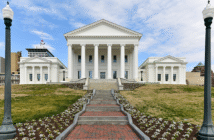
By A.J. Kaufman, Managing Editor
Held inside the ETSU Martin Center for the Arts, the third annual Appalachian Highlands Economic Forum chose Dr. John Silvia, founder of John E. Silvia, Dynamic Economic Strategy, to serve as keynote speaker. The economist’s career also includes serving as managing director and chief economist for Wells Fargo, senior economist for the U.S. Senate Joint Economic Committee, and chief economist for the Senate Banking, Housing and Urban Affairs Committee.
The Massachusetts native discussed ongoing “disruption” in the market, especially due to tariffs and trade uncertainty, which dominated audience questions toward him. Silvia attempted to analyze “what’s next” in terms of how businesses can anticipate inflation and upcoming Fed decisions on interest rates.
“We always look at a framework for economics,” Silvia explained. “Whenever I write, I think about what’s happening with growth, inflation, interest rates and the dollar. Those are the four fundamentals that underlie any economic forecast…inflation expectations are quite different now. That creates a number of problems. We have a Federal Reserve that wants to get to a 2% inflation target. The evidence doesn’t support that anymore. The evidence suggests that inflation expectations are going up, and that’s a big challenge for monetary policy.”
He delved into short- and long-term prospects for the overall economy, including noting that the Federal Reserve Bank of Atlanta anticipates U.S. GDP will decline in 2025’s first quarter.
“And why? Because imports have skyrocketed,” Silvia added. “Businesspeople anticipate what might happen. If you’re telling me, that in April, I’m going to pay a higher tariff to import anything from Europe, Canada and Mexico, I’m importing it today ahead of when the tariffs come in. But when I do that, and imports go up, then the GDP number becomes negative.”
Specifically addressing tariffs and inflation, Silvia concluded, “I think it’s important to understand that oftentimes when something happens in economics, it just doesn’t happen and go away; it stays for a while.”
The event that drew approximately 200 people also featured Barak Saltzman, East Tennessee Division president for D.R. Horton; Heath Guinn, founder of Sync Space; and Dr. Jeff Moorhouse, corporate director of secondary programs for Ballad Health. Several academicians also presented on various topics within the realm of economics.

There was a specific focus on the popular theme of regionalism. Various charts, especially presented by ETSU Economics Professor John Smith, displayed how interdependent the cities and counties of Northeast Tennessee are in terms of their economies, consumers and even daily commutes. Smith defined a region as a contiguous area consisting of administrative units more like each other with respect to particular characteristics than they are in other areas.
The four-hour event closed with discussion among regional Chamber of Commerce leaders. Dr. Tony Pittarese, dean of ETSU’s College of Business and Technology, moderated the panel that included Miles Burdine, President and CEO of the Kingsport Chamber of Commerce; Bob Cantler, President and CEO, Johnson City, Jonesborough, Washington Co. Chamber of Commerce; and Beth Rhinehart, Bristol TN/VA Chamber President and CEO.
It was noted that the Appalachian Highlands, with its two metropolitan statistical areas — Kingsport–Bristol TN-VA and Johnson City — has a $25 billion GDP and roughly a half-million residents. Cantler noted that Sullivan and Washington have seen approximately 9% GDP growth in the past three years, more in the past four years than in the past decade.
“There are a lot of exciting things happening here, and the three of us just need to be intentional to make sure we’re not causing harm and we’re part of the solution and helping that process continue forward,” Cantler explained.
Burdine commended the Kingsport Dental Clinic of the Appalachian Highlands that broke ground last summer and involved collaboration between the University of Tennessee Health Science Center, Ballad Health and ETSU. He also mentioned the BlueSky Tennessee Institute, the partnership between BlueCross BlueShield of Tennessee and ETSU to accelerate education. Participants can earn a bachelor’s degree and secure a career at the same time, then receive a job offer with the company. The first cohort graduated last December.
Rhinehart spoke and boasted about the uniqueness of Bristol’s geography and footprint.
“There are challenges that come with that, but I always say that we have to maximize the opportunities and minimize the challenges and that’s really through leadership,” she said, noting she works with multiple mayors, county commissions, two city councils, two sets of state legislators, two congressional members and four U.S. senators.
Rhinehart explained, however, that she can leverage those relationships so politicians care about what occurs on both sides of the state line.
“Who else has that kind of opportunity for the region? And that’s not just Bristol specific; that’s going to carry out across the region,” she concluded. “We need to use those opportunities as much as we can and maximize their potential.”



